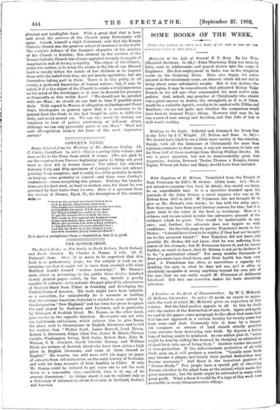THE SCOTCH-IRISH.
The Scotch-Irish ; or, The Scotch in North Britain, North Ireland, and North America. By Charles A. Hanna. 2 vols. (G. P. Putnam's Sons. 42s.)—It is much to be regretted that this book is so portentously large ; for the subject is such an in- teresting one that it ought not to have been overlaid with what Matthew Arnold termed " useless knowledge." Mr. Hanna's main object in presenting to the public these twelve hundred closely printed pages—which, by the way, include a goodly number of extracts—is to indicate the part played by adventurers of Scottish blood from Ulster in founding and developing the United States of America. His work might have been valuable as a corrective, for undoubtedly he is accurate in holding that the average American historian is misled to some extent by the designation "New England," and has been too prone to ignore the part played by Scotsmen and Irishmen, and in particular by Irishmen of Scottish blood. Mr. Hanna, on the other hand, goes too far in the opposite direction. He wearies one out with his Caledonian enthusiasm, which induces him to give Burns the place next to Shakespeare in English literature, and to tell his readers that " Walter Scott, James Boswell, Lord Byron, Robert L. Stevenson, Edgar Allan Poe, James M. Barrie, Thomas Carlyle, Washington Irving, Hall Caine, Robert Barr, John M. Watson, S. R. Crockett, David Christie Murray, and William Black are writers of Scottish blood who have been given a high place in English literature, and some of them classed as English." He wearies one still more with his pages on pages of extracts from old authorities on the early history of Scotland, and with his long accounts of Irish families in Ulster. If only Mr. Hanna could be induced to get some one to cut his work down to a reasonable size,—one-third, that is to say, of its present dimensions ! As things stand, it can be utilised only as a dictionary of information about Scotsmen in Scotland, Ireland, and America.










































 Previous page
Previous page